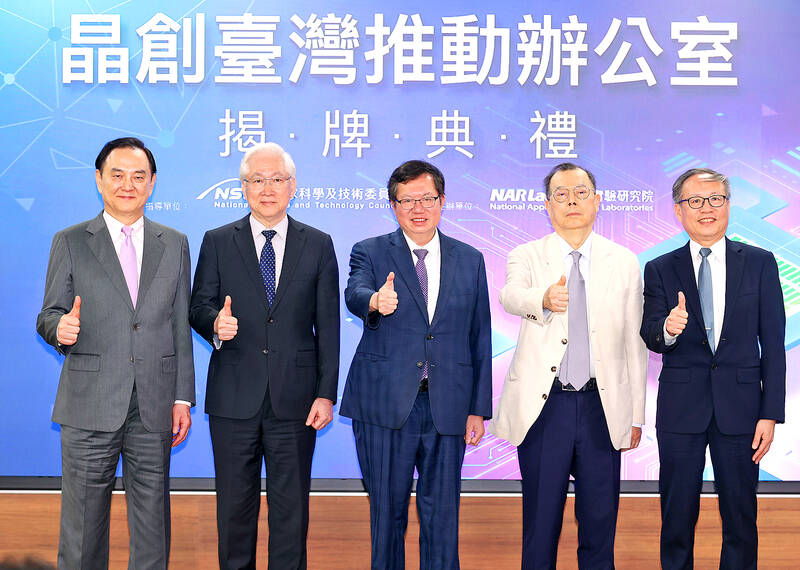Taiwan on Tuesday opened a Chip-based Industrial Innovation Program office with NT$300 billion (US$9.25 billion) in funding earmarked over 10 years, during a ceremony witnessed by representatives from IC design and foundry companies such as Powerchip Semiconductor Manufacturing Corp, Mediatek Inc and Taiwan Semiconductor Manufacturing Co.
The program, which was approved last year, starts this year and aims to boost the innovation of Taiwan’s generative artificial intelligence (AI) in all industries and continue IC technological development on the basis of the nation’s edge in chipmaking, National Science and Technology Council Minister Wu Tsung-tsong (吳政忠) said at the launch event.
Wu said Taiwan is now “treading a path where it no longer has anyone to follow” and has to “advance with the support of everyone in the country.”

Photo: CNA
Taiwan’s semiconductor industry has a lead of at least 15 years, but it is crucial the country uses that 15-year gap to further strengthen its prowess across the IC chain, from upstream IC design and intellectual property design to equipment, materials and chemicals, Wu said.
Approving Wu’s comment, Vice Premier Cheng Wen-tsan (鄭文燦) at the event said that it was the reason Wu proposed the program to President Tsai Ing-wen (蔡英文) last year.
Taiwan can enlarge its 20 percent share of the IC design market by making advances in cutting-edge AI products and AI applications — or AI products and applications that move computing away from the cloud to the users’ devices, Cheng said.
“Taiwan is a reliable and trustworthy science research partner and also a go-to partner for friend-shoring [or sourcing from geopolitical friends],” Cheng said.
While there has been a call for “Taiwan plus one” — meaning companies trying to “de-risk” their manufacturing by moving to countries other than Taiwan — “as long as Taiwan has a leading edge in the semiconductor ecosystem, it would be meaningless to have ‘plus one’ if you do not have Taiwan in the first place,” the vice premier said.
The program’s office unveiled officially on Tuesday will serve as a platform coordinating resources from the government, the industrial sector and academia, said Chiueh Tzi-dar (闕志達), acting executive chief of the office.
“It will operate with the aim of undertaking the four areas of the program: industrial innovation with AI, IC design advancement, talent cultivation and facilitating foreign investment with the lure of Taiwan’s IC infrastructure,” Chiueh said.

Eight restaurants in Taiwan yesterday secured a one-star rating from the Michelin Guide Taiwan for the first time, while three one-star restaurants from last year’s edition were promoted to two stars. Forty-three restaurants were awarded one star this year, including 34 in Taipei, five in Taichung and four in Kaohsiung. Hosu (好嶼), Chuan Ya (川雅), Sushi Kajin (鮨嘉仁), aMaze (心宴), La Vie by Thomas Buhner, Yuan Yi (元一) and Frassi in Taipei and Front House (方蒔) in Kaohsiung received a one-star rating for the first time. Hosu is known for innovative Taiwanese dishes, while Chuan Ya serves Sichuan cuisine and aMaze specializes

Taitung County is to launch charter flights to Malaysia at the end of this year, after setting up flights to Vietnam and Thailand, the Taitung County Government said yesterday. The new charter flight services, provided by low-cost carrier Batik Air Malaysia, would be part of five-day tour packages for visits to Taitung County or Malaysia. The Batik Air charter flight, with about 200 seats, would take Malaysian tourists to Taitung on Dec. 30 and then at 12:35pm return to Kuala Lumpur with Taiwanese tourists. Another charter flight would bring the Taiwanese home on Jan. 3 next year, arriving at 5:30pm, before taking the

Taiwan High Speed Rail Corp. (THSRC) plans to ease strained capacity during peak hours by introducing new fare rules restricting passengers traveling without reserved seats in 2026, company Chairman Shih Che (史哲) said Wednesday. THSRC needs to tackle its capacity issue because there have been several occasions where passengers holding tickets with reserved seats did not make it onto their train in stations packed with individuals traveling without a reserved seat, Shih told reporters in a joint interview in Taipei. Non-reserved seats allow travelers maximum flexibility, but it has led to issues relating to quality of service and safety concerns, especially during

An exhibition celebrating Taiwan and Japan’s comic culture opened on Saturday in Taichung, featuring a section that explores Taiwanese reproductions of Japanese comics from when martial law limited Japanese representation. “A Century of Manga Culture: An Encounter of Taiwan and Japan’s Youth” held its Taiwan opening ceremony at Taichung’s National Taiwan Museum of Comics after an initial one-month run in Japan’s Kyoto International Manga Museum between May 24 and June 24. Much like the Kyoto exhibition, the show mainly celebrates the comic connection between Taiwan and Japan through late Taiwanese comic book